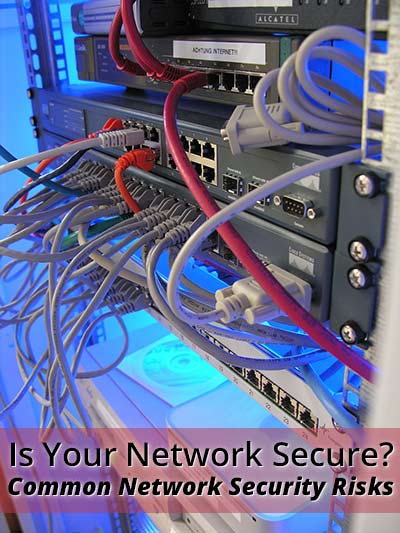 One of the most preventable problems facing small businesses today is lax network security policies.
One of the most preventable problems facing small businesses today is lax network security policies.
PCWorld says that in 2012, 31% of all network security breaches were perpetrated against small businesses. Many organizations have the “It can’t happen to me” attitude. Without proper training and awareness, small businesses can become at risk for falling victim to a network security incident.
Software Can Pose a Security Risk
Intruders aren’t typically capitalizing on security flaws in hardware, they’re looking for security holes in software. Did you know that an unpatched operating system can potentially contain hundreds of unfixed security flaws? Factor in lackadaisical security measures and a compromised password or two, and you might as well prop open your office’s front door and disable the alarm. Good network security practices involve your staff taking the proper steps to ensure your end user’s software stays patched and updated. The best way to mitigate attacks is to keep your systems centrally patched using a utility such as WSUS.
When assigning passwords for software, ensure that your organization follows best practices for password maintenance which will ensure the security of your data. Only assign administrator privileges to end users that absolutely require it for their day-to-day job functions. Otherwise, utilize group policy objects to lockdown certain aspects of their computing experience.
Lockdown Your Physical Hardware
While security appliances provide an extra layer of protection, they certainly aren’t foolproof. You should always secure your networking closet with a locked door that has its outer perimeter monitored by security cameras.
A motivated and knowledgeable intruder can put your network at risk if you have old hardware with out-of-date firmware. Even with the amount of network security awareness training available, systems administrators sometimes forget that routers and switches are commonly setup using default, out-of-the-box passwords that are published freely online.
Ensure that you audit all of the login portals of your hardware devices and double check the user accounts to make sure no users are allowed to login with the default password. You should always install a physical firewall appliance in your data center within your organization whenever possible. More importantly, you will need to have your firewall properly configured so that it doesn’t inadvertently offer an open window into your network from the internet.
Networking Tools: The Best Things in Life Are Free
There is a plethora of free network analysis tools available which will help you harden and analyze your network’s settings.
Free testing tools such as Wireshark, Spiceworks, and Microsoft Network Monitor can be freely downloaded from their vendor’s websites. Do a little research and find a tool that you feel comfortable using on your network.
Some of the most robust network security tools are free. If you’re wanting to perform complex network security analysis, you could download a Linux distro called Kali which will allow you to perform sophisticated penetration testing on your network.
Network security doesn’t have to be a complex issue for your organization. Some of the easiest methods for securing a system are often the most effective. Once you master the basics of network security, your organization can focus on it’s most important task: attracting more customers.
If you’d rather spend 100% of your time attracting and delighting your customers, call Wolf Technology Group at (833) 482-6435 or contact us online; we’d be more than happy to take care of your network while you focus on growing your Greenville, SC or Atlanta, GA area business. Not sure what your network needs? We can help there too with our in-depth Network Assessment.
If you enjoyed this IT Support article, please check out other posts on our blog and join us on Facebook, Twitter, LinkedIn, and Google+ to see how else we can help your Greenville, SC or Atlanta, GA area business succeed!

